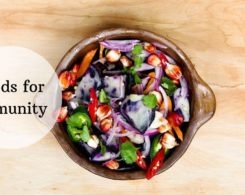- 2Shares
- 1. Include More Iron-Rich Foods.
- 2. Build Stronger Bones With Calcium.
- 3. No Processed Food.
- 4. Zinc Strengthens Immunity.
- 5. Keep Her Dinner Light.
- 6. Make Smarter Choices For Snacks.
Teen nutrition is essential to keep up with the needs of an active lifestyle and constant transitions a girl has to face. She might be a picky eater but when it comes to “diet for teenage girls,” pack it up with the essential vitamins and minerals. Puberty in girls is life changing and challenging. Therefore, she needs to cope with those changes in a practical way. Since one size doesn’t fit all, we’ve put together a very basic and general diet plan for teenage girls along with some everyday tips.
Diet For Teenage Girls
1. Include More Iron-Rich Foods.
Dark green leafy veggies, pumpkin, broccoli, lentils, beans, and fortified plant iron will help ease the phase of puberty in girls. If she’s between 14 to 18 years of age, 15 mg per day is what she requires. Also, increase her Vitamin C intake alongside iron to boost the absorption.
2. Build Stronger Bones With Calcium.
When puberty starts, it’s time to take care of her bone health even more. Underweight teenage girls are at the risk of developing osteoporosis. Thus, 1300 mg is the ideal calcium consumption if she’s between the age of 14 to 18 years. Tofu, spinach, soya beans, nuts, and yogurt are good for her.
3. No Processed Food.
We know she’s busy with her studies, trying to understand her body changes, meeting new people, making friends and is also eating out. But, it’s your responsibility to help her cut down her junk consumption. Her body is growing and it needs real nutrition. Therefore, set an example for her so she can learn to make better food choices.
4. Zinc Strengthens Immunity.
Zinc helps the child reach an ideal height as well as weight. It ensures that her body’s developing properly. So, girls between 14 to 18 years of age need around 9 mg of zinc each day. Cover up her zinc intake with legumes, fortified cereals, whole grains, kidney and black beans, lentils as well as peanuts.
5. Keep Her Dinner Light.
Don’t let her skip dinnertime, instead keep the carbs low. Feed her a light and healthy meal. The idea for fulfilling teen nutrition is to combine it with her preferred taste. A perfect diet for teenage girls must include salads, green veggies, fresh fruits, soup and more.
6. Make Smarter Choices For Snacks.
Your child is growing and so she’s bound to keep munching. As a parent, what she eats is up to you. Offer her figs, roasted lotus seeds, almonds, and dates with warm milk to energize the body. And, make sure there’s a time set for snacking.
Diet Plan For Teenage Girls
Puberty in girls leads to several body changes. You as a parent/ guardian need to take care of her nutrition. Therefore, here’s a very basic diet plan for teenage girls to start with:
Breakfast –
Start with a glass of warm water every morning. Mix some honey and lemon juice for an added benefit. Her breakfast can include a multigrain bread sandwich stuffed with some peanut butter and slices of cucumber, tomatoes as well as cottage cheese. A strawberry and almond butter wrap also works.
A healthy diet for teenage girls can incorporate snacks like nuts, a glass of buttermilk or simply some coconut water.
Lunch –
Feed her a tortilla wrap. Spread some cream cheese and stuff the wrap with sauteed veggies like red, green and yellow bell peppers, baby spinach, shredded carrots, chives, fresh dill, and cucumber. Team it up with roasted sweet potatoes, choicest dip and berries according to the season.
Dinner –
Teen nutrition is incomplete without an evening snack. So, give her a fruit along with some pumpkin or sunflower seeds. Keeping the dinnertime light, offer her with a vegetable soup, rice pancakes or quinoa pilaf.
Note: Articles on Ayurvedum are solely for the purpose of sharing the goodness of Ayurveda and bringing awareness on natural and healthy living. Please do not substitute it for professional medical advice. Ingredients discussed can interfere with certain medications. So, before using anything to treat yourself, always consult an Ayurveda doctor or practitioner.






Leave a Reply